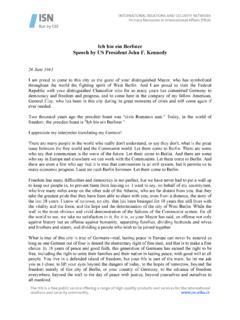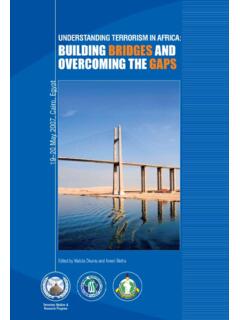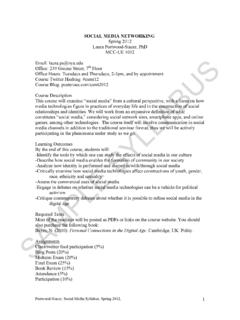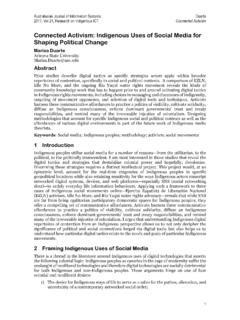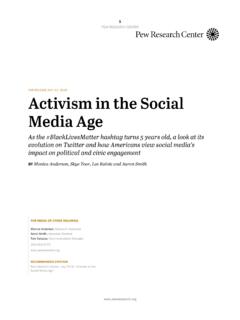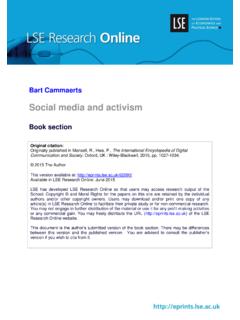Transcription of Digital Activism: Efficacies and Burdens of Social Media ...
1 Arab Media & Society (Issue 19, Fall 2014) Digital activism 1 Digital activism : Efficacies and Burdens of Social Media for Civic activism Jad Melki, Sarah Mallat Abstract This article explores Digital activism among Lebanese Social movement organizations (SMOs) using a Social movements theoretical framework.. It highlights the commonly used Digital and Social Media tools for activism , and analyzes their perceived benefits and disadvantages. The study used a mixed methods approach, combining qualitative interviews, focus group, and participant observation methods. It found that Digital activism is on the rise, and that Social Media platforms offer many perceived benefits for activism work, but also create significant obstacles in both the Digital and offline realms. As such, this article offers recommendations, based on best practices, to bolster the efficacy of Digital activism in Lebanon.
2 Introduction Following the 2011 Arab uprisings, academics debated the role Digital and Social Media played in these uprisings. Much of the discussions centered on Egypt and Tunisia, where the most successful revolts took place. Other Arab countries like Lebanon, where the outcomes varied between repeated failures and incremental successes, remained overlooked, despite offering a rich experience and comprising a vibrant civil society. Accordingly, this study explores Digital activism in Lebanon, particularly because of its unique socio-political context, its avant-garde position in the region, and its growing pulse of activism . The study investigates how local activists utilize Digital and Social Media . It explores the perceived benefits and Burdens of such platforms a matter not greatly addressed in the literature (Garrett, 2006) and the broader implications for Digital activism in society.
3 In this study, Digital activism refers to the use of Digital technologies to facilitate change in the political and Social realms (Joyce, 2010). These tools include the Internet in its various applications, mobile phones, and other Digital devices. The term Social Movement Organization (SMO) encompasses non-governmental organizations, civil society organizations, and activists. Social movements are shared feelings or activities that aim towards changing Social systems or Social relations (Ash Garner and Zald, 1987). Literature Review Despite attracting many scholars recently, research on Digital activism in the Arab world remains rare, especially country-specific and empirically driven research. This section starts with a theoretical framework for the study and then discusses the three factors of this framework in the Lebanese context.
4 Digital Media and Social Movement Theory. This study uses a Social movements theory analytical lens. Various Social sciences disciplines have studied the effects of new Media technologies on Social movements, offering a wide range of disconnected scholarship on the matter. Garrett (2006) advanced a theoretical framework that built on the commonly used McAdam, McCarthy, and Zald (1996) framework in an attempt to align the diverse studies and methods into a more coherent body of literature. This study adopts the same framework that Arab Media & Society (Issue 19, Fall 2014) Digital activism 2 explains Social movements through three interrelated factors: mobilizing structures, opportunity structures and framing processes (Garrett, 2006, p. 203). Mobilizing structures entail the formal and informal organizations and relationships and familiar forms of protest that enable citizens to organize themselves into Social movements.
5 Opportunity structures are the political structures and opportunities that facilitate or constrain a movement s action. Finally, framing processes refer to the collective efforts and processes engaged in interpreting events, advancing perspective, constructing realities, unifying visions and perspectives, and contesting opposing discourses. The rest of this section is organized according to these three factors. Framing Opportunities: Lebanon s Diverse Media Landscape and Fractured Public Sphere. Freedom of speech and assembly, and the right to dissent, have long been suppressed in most Arab countries. Freedom House (2011) considers all but three countries in the region Not Free. Kuwait, Lebanon, and Morocco are considered Partly Free. The controversial source notwithstanding, it is hard to deny that most Arab governments are closed, authoritarian, and oppressive, albeit to varying degrees (Barakat, 1993).
6 In comparison, Lebanon s curious political system has historically offered its population greater civil liberties. These freedoms nevertheless remain checked by rampant political and economic corruption stemming from rigid nepotistic alliances backed by sectarian institutions and clerics (Khashan, 2011; Makdisi et al., 2010). According to the Corruption Perceptions Index, Lebanon ranks 134 out of 183 countries (Transparency International, 2010). Censorship in Lebanon is nowhere near as stringent as in its regional counterparts, although journalists and bloggers self-censor for personal safety (Alabaster, 2011). Lebanon has a long tradition of press freedom, though nearly all Media have ties to political groups (Al-Najjar, 2011), creating limited opportunities for advancing independent perspectives or contesting opposing discourses without appearing as a partisan.
7 Moreover, while the constitution guarantees freedom of religion, religious discrimination remains rampant. Sectarian affiliation regulates day-to-day affairs and major life decisions (Haddad, 2002; Ofeish, 1999). Furthermore, each sect has its own laws for dealing with family and personal-status matters (Shehadeh, 1998). In the absence of strong secular forces in the country, this sectarian environment results in a fractured public sphere, divided essentially into smaller sectarian public spheres (Dawahare, 2000) that rarely interact despite overlapping interests. This fractured public sphere and its corresponding partisan Media ecosystem impose on the country s citizens a sectarian lens for interpreting any national or local issue, potentially limiting and distorting framing opportunities for activists who champion even the most non-partisan public causes.
8 Lebanon s Mobilizing Structures: Civil Society and its Causes. Over the past two decades, the Arab world has witnessed unprecedented population growth accompanied by a region-wide youth bulge. By 2003, youth under the age of 24 made up 50% to 65% of the population, a rate that continues to expand (Fuller, 2003). In Lebanon, youth aged 15-24 comprised of the population in 2007 (Central, 2007). Accompanying this growth is an expanding civil society. In 2005, the official number of NGOs in Lebanon surpassed 3,500 (UNDP, 2009). This large number of organizations for a population of four million parallels the large number of issues facing youth. Arab Media & Society (Issue 19, Fall 2014) Digital activism 3 In recent years, hundreds of thousands of Lebanese rallied in favor of or in opposition to the government. Also common are demonstrations and rallies to champion civil rights and liberties of citizens or others living or working in Lebanon.
9 Local SMOs, which operate openly and legally, spearhead many of these protests that vary from women s rights to advocating for cheaper Internet access. While Lebanese women enjoy many of the same rights as men, they experience Social and legal discrimination. Paramount among these are discriminatory laws governing marriage, divorce, inheritance, and child custody (Shehadeh, 1998). Lebanese women married to non-citizens cannot transfer citizenship to their children and do not receive equal Social -security provisions (Farhood, 2009). Women are severely underrepresented in political office and in the news industry (IWMF, 2011). Furthermore, men convicted of honor crimes against women usually receive lenient sentences, if any adjudication takes place at all (Freedom House, 2011). Refugees, minorities, and migrant workers have few rights under Lebanese law.
10 While some progress has been made to combat arbitrary detention, inhumane treatment, and torture of refugees and illegal immigrants, officials often don t enforce regulations pertaining to these matters (Freedom House, 2011). The nearly 350,000 Palestinian refugees living in Lebanon are denied citizenship and civil rights and face arduous restrictions on working, building homes, and purchasing property (Hanafi and Tiltes, 2008). Migrant workers, particularly female domestic workers, often face exploitation, and physical, psychological, and sexual abuse. Human Rights Watch (2008) revealed more than one migrant domestic worker dies each week in Lebanon. Most of them die either by suicide or by falling from buildings while attempting to escape from their employers. While most SMOs operate openly and legally, the case is different for Lebanese groups that advocate LGBTQ rights, as homosexuality remains illegal.





